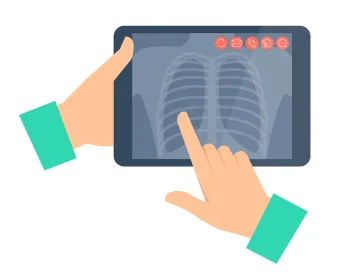Telehealth is going to play a critical role in the delivery of care in the coming weeks and months as health care providers respond to the COVID-19 pandemic. As the CDC and other public health agencies continue to recommend social distancing and self-quarantine after exposure, telehealth is a vital tool for getting both sick and healthy individuals access to health care services they need if in-person services are not necessary. The use of telehealth services should help alleviate the ever-growing pressures on health care systems as they respond to the outbreak. In light of these benefits, the Emergency Appropriations Bill passed by Congress last week includes provisions that allow the Secretary of Health and Human Services (HHS) to lift certain restrictions that are currently required for Medicare reimbursement of telehealth services. These restrictions, which HHS can waive for Medicare covered telehealth services, include the following:
- Originating Site. Medicare reimbursement rules require the patient to be located in a rural area at a designated “originating site.” The Emergency Appropriations Bill allows HHS to lift both restrictions so that patients do not have to be in rural areas and can be located anywhere, including in their own home.
- Technology Modality. Medicare currently requires real-time, audio and video technology for telehealth services to be reimbursable. The Emergency Appropriations Bill clarified that services can be provided via a smartphone, provided that it has both audio and video capabilities.
These changes to Medicare’s reimbursement rules, combined with more liberal coverage under most state Medicaid programs and commercial insurance plans, are expected to result in increased use of telehealth in the months ahead. Some states are taking additional action to loosen restrictions for telehealth reimbursement by Medicaid and/or commercial insurers, like Massachusetts. On March 15, 2020, Massachusetts issued an order requiring commercial insurers to cover medically necessary telehealth services in the same manner as in-person services and to reimburse providers for telehealth services at the same or higher rates as in-person services. The order also prohibits commercial insurers from requiring prior authorization for telehealth services.
Although Congress has given HHS the ability to loosen restrictions for Medicare reimbursement for telehealth services, providers who offer telehealth services should remember that other state and federal practice laws still apply. Generally, providers must make sure to establish a physician-patient relationship, be licensed in the state where the patient is located, and obtain sufficient information to make a diagnosis or treatment recommendation. State and federal laws may also restrict how providers issue prescriptions via telehealth. For more information, see the video below or click here.





 />i
/>i
